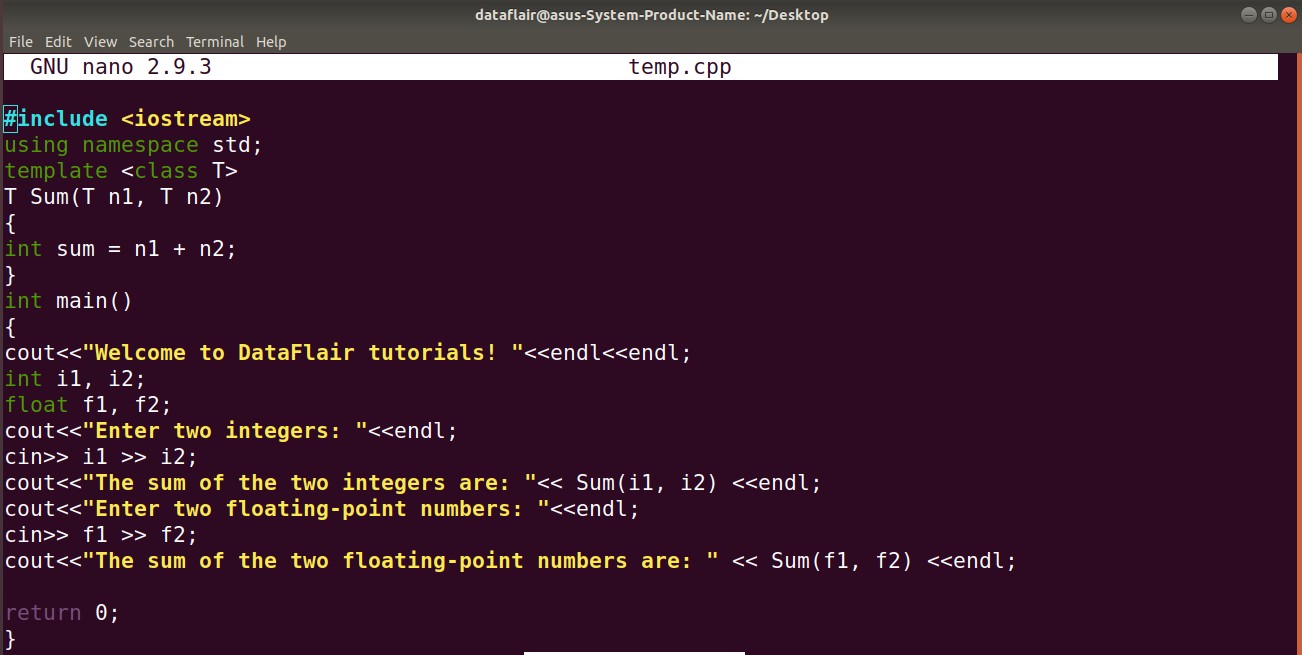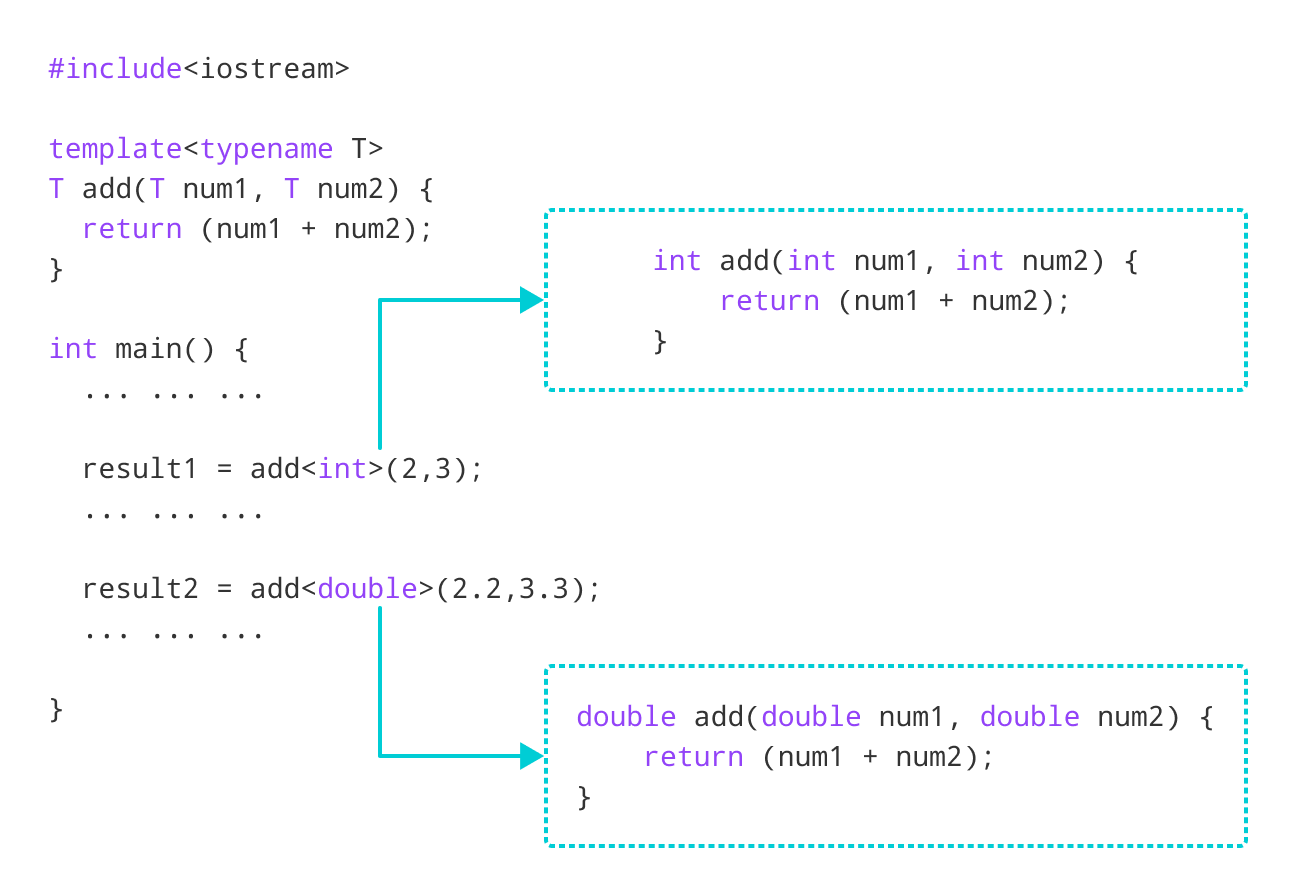Templated Functions C++
Templated Functions C++ - Why would we need a virtual template function? Web c++20 introduces a new use of the auto keyword: Web a template is a c++ entity that defines one of the following: Function templates are special functions that can operate with generic types. A family of functions (function. Template declarations ( class, function, and variables (since c++14)) can appear inside a member specification of any class, struct, or union. Member functions of class templates. There are three kinds of templates: Function templates, class templates and, since c++14, variable templates. This allows us to create a function template whose functionality can be.
C++ Template A Simple and Excellent Concept to Master DataFlair
Web template functions and class templates are one of the many superpowers of c++. A family of classes (class template), which may be nested classes. The following solved my problem,. Web this article describes rules that are specific to c++ class templates. Web i'm not sure why nobody else has suggested this, but you can write a templated function that.
C++ Templates Function Template YouTube
This allows us to create a function template whose functionality can be. Defining a function template follows the same syntax as a regular. Since c++11, templates may be. Web in c++, the template system was designed to simplify the process of creating functions (or classes) that are able to work with different data types. Web in this article.
C++ Redefinition Of Template Function
Since c++11, templates may be. Why would we need a virtual template function? Member function templates are function. Member functions of class templates. A family of classes (class template), which may be nested classes.
C++ Redefinition Of Template Function
Web the advantage of these last two approaches is that the caller of f can provide a tuple of lambdas, functors, function pointers, or any combination that is compatible with the call signature of the respective std::function in the first approach. Web the process of creating functions (with specific types) from function templates (with template types) is called function template.
C++ Redefinition Of Template Function
Web i'm not sure why nobody else has suggested this, but you can write a templated function that returns lambda functions. Why would we need a virtual template function? Web the advantage of these last two approaches is that the caller of f can provide a tuple of lambdas, functors, function pointers, or any combination that is compatible with the.
C++ Redefinition Of Template Function
Why would we need a virtual template function? Defining a function template follows the same syntax as a regular. Web c++20 introduces a new use of the auto keyword: Member functions of class templates. Template declarations ( class, function, and variables (since c++14)) can appear inside a member specification of any class, struct, or union.
Templates in C++ Simple Snippets
Function templates, class templates and, since c++14, variable templates. Web the advantage of these last two approaches is that the caller of f can provide a tuple of lambdas, functors, function pointers, or any combination that is compatible with the call signature of the respective std::function in the first approach. Member functions can be defined inside or outside of a..
C++ Template Specialization
Web in c++, the template system was designed to simplify the process of creating functions (or classes) that are able to work with different data types. The term member template refers to both member function templates and nested class templates. Web in this post, i will describe how to use policy based design to simulate virtual template functions in c++..
Top 50 C++ Interview questions and Answers
There are three kinds of templates: Web a template is a construct that generates an ordinary type or function at compile time based on arguments the user supplies for the template parameters. A family of functions (function. Web in this post, i will describe how to use policy based design to simulate virtual template functions in c++. Why would we.
C++ Template Function In Class? Trust The Answer
Web i'm not sure why nobody else has suggested this, but you can write a templated function that returns lambda functions. The term member template refers to both member function templates and nested class templates. The following solved my problem,. Web template functions and class templates are one of the many superpowers of c++. Web for cases such as this,.
A family of functions (function. The following solved my problem,. Web for cases such as this, c++ has the ability to define functions with generic types, known as function templates. Member functions can be defined inside or outside of a. Web in this article. Web the process of creating functions (with specific types) from function templates (with template types) is called function template instantiation (or. There are three kinds of templates: This allows us to create a function template whose functionality can be. Defining a function template follows the same syntax as a regular. The term member template refers to both member function templates and nested class templates. Function templates are special functions that can operate with generic types. C++ templates can be used both for classes and for functions in c++. Since c++11, templates may be. Web a template is a c++ entity that defines one of the following: Web in this post, i will describe how to use policy based design to simulate virtual template functions in c++. Web i'm not sure why nobody else has suggested this, but you can write a templated function that returns lambda functions. Web a template is a construct that generates an ordinary type or function at compile time based on arguments the user supplies for the template parameters. Why would we need a virtual template function? Web the first member function is fine, but the template member function which handles types other than the base type of the template class is where i am having problems. Templated functions are actually a bit easier to use than templated.
Function Templates Are Special Functions That Can Operate With Generic Types.
Web for class templates, the arguments are either explicitly provided, deduced from the initializer, (since c++17) or defaulted. Function templates, class templates and, since c++14, variable templates. For function templates, the arguments. Member functions of class templates.
Web A Template Is A C++ Entity That Defines One Of The Following:
Why would we need a virtual template function? Web in this post, i will describe how to use policy based design to simulate virtual template functions in c++. The following solved my problem,. Web a template is a construct that generates an ordinary type or function at compile time based on arguments the user supplies for the template parameters.
Member Functions Can Be Defined Inside Or Outside Of A.
Web for cases such as this, c++ has the ability to define functions with generic types, known as function templates. Defining a function template follows the same syntax as a regular. Web in this article. Web i'm not sure why nobody else has suggested this, but you can write a templated function that returns lambda functions.
This Allows Us To Create A Function Template Whose Functionality Can Be.
The term member template refers to both member function templates and nested class templates. Web c++20 introduces a new use of the auto keyword: Web the process of creating functions (with specific types) from function templates (with template types) is called function template instantiation (or. Web the advantage of these last two approaches is that the caller of f can provide a tuple of lambdas, functors, function pointers, or any combination that is compatible with the call signature of the respective std::function in the first approach.








